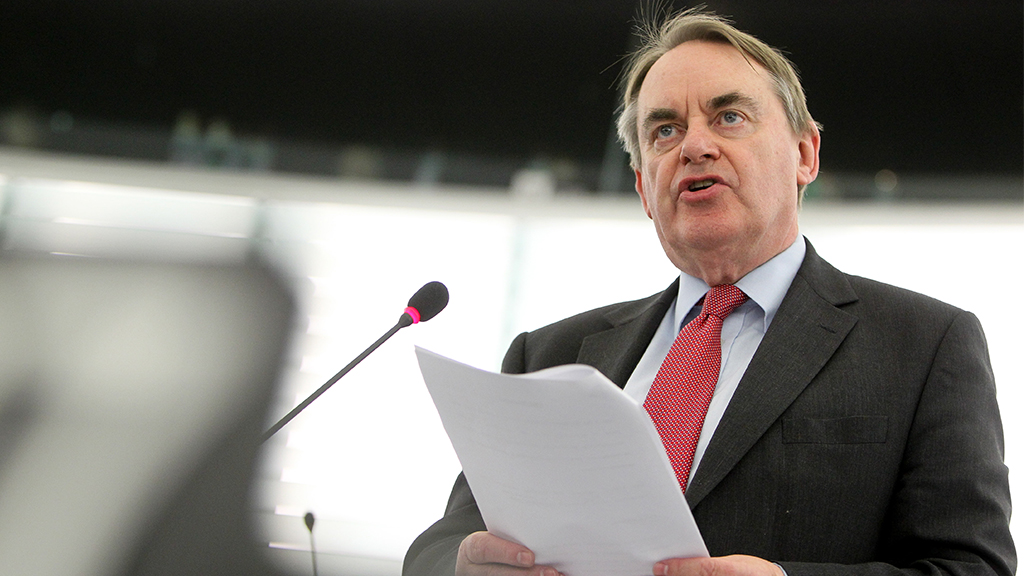Last week we were in Strasbourg, where the European Parliament meets for its plenary sessions. One of the debates in Parliament was about a new EU Directive, which aims to strengthen the procedural safeguarding of children when they are accused of crime. You can read our explainer on the Directive here, and our interview with Green MEP Jean Lambert, who supports the Directive here. We also caught up with Timothy Kirkhope, a Conservative MEP, to hear his views on why his group abstained from the vote, as well as Brexit, and the Human Rights Act…
Timothy, you’re a VP of the Child Rights Intergroup, so we’re really keen to get your view on the vote on the Directive about procedural safeguards for children in criminal proceedings?
Well I’m very enthusiastic about the Directive in that we support all the things in it. You may wonder therefore why my group (the British delegation of the European Conservatives and Reformists Group) abstained. We have a policy in that we tend to abstain if we think that measures coming in are going to interfere with adequate measures that are already in place. We think in certain circumstances the rights of children could actually be impeded by these proposals.
Exc-ightsInfo! Hello from Paris, can't wait to get to Strasbourg…@HayleyChapman5 @charlottejyn pic.twitter.com/YrvjtHnWvl
— RightsInfo (@rights_info) March 8, 2016
The Directive could impede the rights of children? How so?
Some of the proposals are very prescriptive, and we do not like over prescription. We want as much in place as possible, but we don’t think that a Europe-wide measure of this kind is what we need in Britain. It’s not that we’re against enhancing the rights of children, but we feel, and we’ve been told by government, and a number of organisations too, that we’re happy with what we’ve got in place.
To put that in context, could you give us an example of a situation in which a child’s rights might be impeded because of the Directive?
I’d have to think about that really. In some of the areas in which children are being detained, for instance, for interrogation – the UK has a very enlightened approach. But much of it is not tightly controlled by legislation; it is an understanding between the police, and local authorities, social services and NGOs. And it happens to work, as far as I’m aware. There’s a prescription in the Directive about how children will be dealt with in those circumstances, and I think actually, I prefer we didn’t have that. I’m just looking through [flicking through a document] to see if I can get you something absolutely specific to show you…yes I was assured that we have got protections in place for children, but I don’t know the exact detail.
Wouldn’t the “mandatory defence” aspect of the Directive mean that all children did get a legal aid funded lawyer if it was compulsory for the state to provide legal aid?
We had the wider Directive on access to a lawyer which went through, but we did not pass the legal aid measures because every country has a different system. And as you know, the approach to legal aid has been changed in the UK depending on the fiscal position. So forcing something through that obliges legal aid at a certain point is not something that we would agree to. It wouldn’t get through council considerations – not only in Britain but in other European countries too. The thing is, Parliament passes something, and everyone says ‘hooray’ – but actually implementing it is another matter.
The Government’s European Scrutiny Committee released a report in 2014 saying that the cost of implementing the Directive was too much, at £2.1m. Do you have an opinion on that?
My problem is that there are certain things I can influence and certain things I can’t. On the legal aid front, this is purely a domestic question. I personally believe that at a certain point, vulnerable people in particular are more eligible to have legal aid, and that would include children. I’ve always taken a fairly soft view on that. But that doesn’t make much difference in terms of the way legal aid appears to be assessed.
What are your thoughts on legal aid generally?
I’m very pleased the Government has abandoned those proposals on the restrictions on legal aid and the delivery of legal aid. We were going to be putting it into bulk buying in the hands of a few lucky lawyers, and everyone else would have been squeezed out – there wasn’t going to be a a good spread of legal aid around the country. So I’m pleased the Government has withdrawn those proposals. It means there’s a greater ability for people who need legal aid to access it, and that includes children.
If we’re so good on children’s rights in criminal proceedings here in the UK, wouldn’t it be a good thing to be a part of this Directive, sharing our standards and knowledge with other countries?
Look, we have some of the very best parts of the Directive already – the right to a lawyer, for example, we accept. We’ve also been fairly advanced with providing interpreters and we signed up to the Directive on that issue. As you’re probably aware, we opted out of all the justice provisions prior to 2009. But since 2009 we’ve been opting in to virtually everything – we were very keen on the European Arrest Warrant for example.

The European Parliament
We would love your views on Brexit?
I’m sure you would. If it’s of any interest to you, I’m in favour of staying in, and I support the Prime Minister’s position.
Do you think Brexit could affect rights in any way?
The Convention on Human Rights is a Council of Europe thing, so leaving the EU wouldn’t have any impact on that at all, as you know. The question of human rights legislation domestically needs reviewing, because it needs to allow more flexibility. I believe the courts and common law was the basis upon which flexibility could be delivered to defendants. I’ve always fought for common law. As a lawyer, I’ve never been particularly happy with the Human Rights Act (HRA). I believe it was prescriptive; it limited the scope of the courts to be able to make the right decisions. The problem is, producing a Bill of Rights is extremely difficult. I would certainly want to look at the HRA, but I don’t want to interfere with the Convention, of course. That’s important. What’s worried me is that human rights is getting a bad name. I do believe it has been abused, and the focus on some of the articles has made life more difficult for the general approach to protection.
Do you mean Article 8, the right to family and private life?
Well yes, it’s the interpretation. There have been quite a number of cases now which show it needs to be reflected on…
[At this point Mr.Kirkhope had to leave for another engagement, so we didn’t get a chance to explore this further]
Just quickly before we go, it was International Women’s Day on Tuesday – did you celebrate in any way?
[Smiling] No, not really. Although my Jet2.com, my local airline from Leeds, sent a 737 flight, which was an all-women flight. I thought that was great!
Timothy Kirkhope, thank you for your time.
No problem, it was good to talk to you.







